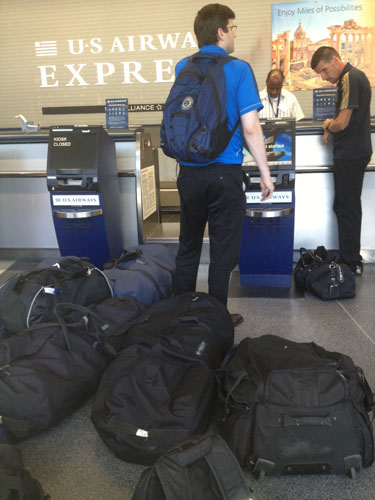Photos: Chris Glidden
Getting a result on the road is hard. It’s so hard that the phrase “getting a result” doesn’t even refer to winning but coming home with a draw.
So what makes playing away so difficult?
PSP talked to the Union to learn more about the challenges of playing on the road. Our series begins with the logistics involved with traveling.
Going on a trip requires planning. When the trip involves 25 to 30 players, coaches, training staff and others, it requires a lot of planning. For Philadelphia Union travel coordinator Josh Gros, that planning begins as soon as the schedule is released in the preseason.
“I think the most important part of my job is to make it as painless and easy as possible for the coaches and players to travel,” Gros told PSP. “What me and [equipment manager Ford Gaitley] and [head athletic trainer Paul Rushing] try to do is to make it so that they don’t have to think about anything but walking into the airport and then going and playing the game.”
After all, this is not the NFL or Major League Baseball. MLS is still a young league establishing itself. “When you travel like an NFL or NBA team it’s pretty luxurious travel and it’s easy,” Gros said. Unlike the other professional sports leagues, MLS teams cannot use charter flights. While a useful cost-saving measure for a growing league, it complicates the travel process.
“Since we fly commercial, I have to look at all of the airlines — we don’t have the luxury of flying charter, so we’re at the mercy of the airlines,” Gros said. “It all comes down to dollars and cents. It costs probably at least 10 times as much to travel charter then it would commercial. I think eventually the league will get there, but based on ticket revenue, TV revenue, it’s just not possible to charter every flight.”
Reserving airline tickets, arranging transport to and from the airport, hotel and away stadium, reservations at the hotel, catering for team meals — all of that is mapped out weeks before the first game of the season. Adjustments are then made based on who makes the travel roster for a given game.
“Coming up that week, maybe a day before we travel, or a couple of days, Hack will give me the 18-man travel party, and then I work with the travel agent to get all of the names switched,” Gros said. “Same process for the hotels and the buses.”
Being a former MLS player himself gives Gros a valuable perspective on how to successfully do his job.
“I’ve been on both sides of it now,” said the former DC United midfielder. “It helps to see what the players want, the coaches want, knowing how it feels to travel cross country and play a game. We gotta take all of that into consideration with length of travel when we travel, so the guys can be fully prepared for the game — the type of food they gotta eat, all that stuff. It definitely helps that I used to play.”
Travel and hotel arrangements are made easier because the league has a designated travel agency, Sportscorp, and teams stay in the same hotel in each city. Traveling to games in Canada requires entry visas for international players on the roster.
Gros travels with the team to make sure things go as smoothly as possible, which in Canada might include leaving a game at halftime with everyone’s passports to ease the immigration process ahead of the team’s return to the States. Still, even the best laid plans can go awry.
“If everything goes well, I really enjoy my job, but there are times when it’s difficult,” Gros said with a laugh.
Sometimes it’s something as simple as flight delays or cancellations. Sometimes it’s something more complicated.
When the Union flew to Denver for the second game of the season, a blizzard blew through town, resulting in the game being postponed a day. That’s when, as Gros said, things can get “interesting.”
“That’s when I get the gray hairs, trying to sort that out within an hour or two.”
In Denver, sorting things out meant scrambling to ensure the team had accommodations for another day, arranging additional food service for team meals, finding a gym the team could use for training so they could stay sharp for the game, and working with the league travel agency to secure new flight reservations for the return to Philadelphia.
All that work paid off when the team returned home 2-1 winners, handing Colorado their first home opener loss in a decade.
“I look at it as I have a pretty good job, a dream job almost,” Gros said. I get to travel with the team. I get to be a part of every game. There’s a lot of times where gets stressful with flights being cancelled or schedules changed. But I feel pretty fortunate to be able to do what I do.”
Packing the gear
We’ve all gotten off of a plane far away from home only to realize we’ve forgotten to pack something. For the Philadelphia Union, it’s the job of equipment manager Ford Gaitley to make sure that doesn’t happen because traveling for a professional sports team means moving not just players, coaches, and staff, but a whole lot of equipment.
How much equipment? For a one-off road game, 10-12 bags of gear is typical. For a road series in which the team will bring extra players in addition to the usual 18-player roster, the number of gear bags rises to as many as 15. For Gaitley, who previously worked as the Union’s visiting team liaison before taking over as equipment manager this season, planning is the key.
“My preparation and work load really comes into play before we head out to a city because you don’t want to get on the bus or on the plane and say, ‘Oh my God, I totally forgot to do that,'” Gaitley explained. “So I have a checklist for everything that I carry just so I know that I crossed it off and it’s packed and we’re good to go.”
After receiving the travel roster, Gaitley lays out mesh bags around the locker room to pack each player’s gear. “It makes my job easier when I get to the home team’s stadium so all I have to do to set up is lay out the mesh bags,” Gaitley said. “Jerseys, shorts, sliders, socks, warmup top, everything’s all within that bag so I don’t have to go through eight different bags to get everything I need.”
A road series means more of everything and, with so much gear, organization is essential. Gaitley, who works with an assistant and an intern, explained how he has an equipment catalog “of everything we’re traveling with so I know when I’m throwing it in a bus, bag four has cleats in it and bag six has socks, and so on.”
Gaitley packs a minimum of three sets of jerseys for a game, one to start the game, one to change into at halftime, and another “just in case” so the team isn’t caught shorthanded away from home. This is as much related to what the team needs to play as it is to the “presentation gear,” the casual uniform the team wears when they travel.
“There’s always one guy who forgets on a game day or when we travel, so I always have extra,” Gaitley said. “So everyone can be clean and presentable, that’s what we always try to up keep. This is a professional team and people are always looking at them all the time.”
Gaitley’s preparation also includes checking the weather forecasts for the city the team is traveling to, which can affect not just the playing gear that is packed but what is worn during training and on the sidelines during a game.
While an extraordinary event like the blizzard in Colorado can make things “a little chaotic,” Gaitley described how a kind of brotherhood of equipment managers exists in the league.
“Every equipment manager in the league, we’re all on the same page,” Gaitley said. “They’re great guys and everyone can help each other out. Since we’re all sponsored by adidas, if somebody forgets their boots I’ll take a pair of theirs and send them back when I get home, things like that. Everybody’s in the same boat, everybody’s very accommodating. When we have a home game, I usually reach out to them in case they need anything.”
Unloading all of the that gear is something with which Union defender Amobi Okugo is familiar. “Getting the gear to the bus and that stuff — luckily I’m not a rookie anymore,” Okugo said. “It used to be bad, you’d have to wait and be the last one.
“We leave that to Leo and Don and those guys now,” said Okugo with a laugh. “Luckily for me.”



Interesting behind-the-scenes look. I always wondered how they managed to get the flight reservations, since they don’t know in advance who will be in the 18.
Nice , behind the scenes piece. I really enjoyed it. I don’t think a lot of folks really know or understand what has to happen when a team travels . The team doesn’t just magically appear on the TV set . 🙂
Cheers
Great article, gave a really cool insight!
Interesting to see how important making a list and checking it twice is. Lots of behind the scenes work goes into winning!!
“Every equipment manager in the league, we’re all on the same page,” Gaitley said. “They’re great guys and everyone can help each other out. Since we’re all sponsored by adidas, if somebody forgets their boots I’ll take a pair of theirs and send them back when I get home, things like that. Everybody’s in the same boat, everybody’s very accommodating. When we have a home game, I usually reach out to them in case they need anything.”
.
Interesting comment. Back in the wild west days of MLS 1.0, when everything was organized haphazardly by the individual teams, Chivas USA came to play the MetroStars and Paco Palencia’s cleats had gone missing. I actually handed him a pair from the nearby store I worked in, which he used to score 2 goals in a wild 3:3 thriller. In exchange we got some pictures and autographs to hang in the store.
.
I won’t go into the time when I had to print lettering one Sunday morning for the entire Honduras national team at the Gold Cup…suffice it to say, times have changed!
BThomas, thanks for sharing those stories (and thanks to everyone for their kind comments)!
Speaking of lettering, I asked Ford his thoughts on the extra “W” on the Wondolowski jersey episode from the Gold Cup. He agreed it was pretty funny – in a “There but for the grace of God” kind of way.